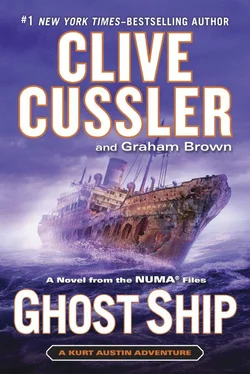“You make a sound, it’ll be your last,” he warned the man.
The guard went still and then nodded, his sense of shock growing as Joe appeared under the overhang like a specter materializing from another dimension. As Joe dropped down on the ground to truss up the other guard, his movements were a blur as the armor continuously changed both its color and texture. Kurt noticed the man he’d captured scrunching his eyes shut and then looking away as if he were hallucinating.
“You people are holding some friends of ours,” he whispered to his captive. “Are they here? In this building?”
The guard nodded.
Kurt glanced at Joe. “Check the door.”
Joe was already in the process. “Locked tight.”
“Keys,” Kurt demanded.
The guard reached a shaking hand into his breast pocket and pulled out a ring with two keys on it.
Joe took the ring and went to work, finding two bolts, one for each key. Having unlocked the door, he cracked it open. “It’s dark, I don’t see anyone.”
“I must have cut the power to the entire building,” Kurt said, pulling the guard to his feet.
As Joe pulled the door open, Kurt pushed the guard through first in case someone attacked. Fortunately, that didn’t happen.
Looking around, Kurt saw a dozen people huddled in the far corner of the darkened room. They were hiding behind a pile of mattresses, a small table, and several chairs. He counted three men, three women, and seven children of various ages. They seemed as frightened of him and Joe as the guards had been. After what they’d been through, Kurt didn’t blame them.
“It’s all right,” he said, “we’re here to help you. We’re getting you out of here.”
They seemed too afraid to respond, so Kurt flipped up his goggles and pulled out a flashlight, shining it on them. He didn’t recognize most of the group, but two of the grimy-faced children looked like Sienna’s son and daughter.
“You’re Tanner, right?”
The boy nodded.
“And you’re Elise?”
The girl was too afraid to say anything. She just stood there, gripping the hem of her shirt.
“It’s okay,” Kurt said, brushing her hair back. “We’re taking you home. Where’s your mom?”
Elise just stared at him, but Tanner pointed at the guards. “They took her.”
Kurt looked at the guard on his knees.
“Where’s Sienna Westgate?”
“I don’t know,” the guy said. “They took her up to the main house, but I don’t know where.”
One of the other adults came forward. He looked familiar. “I saw you in the tunnel in Korea,” Kurt said.
His English was vaguely European. Kurt guessed that Spanish, Portuguese, or even Italian was his first language.
“You’re Montresor,” Kurt said, using his hacker name.
The man nodded again. “My real name is Diego. I know where they took her. The man who runs things, Sebastian, he has a control room on the top floor. He watches everything from there, I think. Directly below him is a networked series of high-end processors and computers. When they took me up to the house to work, that is where they kept me.”
“What did they have you do?” Kurt asked.
“I hack into a system and edit programs. I create hidden doorways and what we call hides or blinds.”
“Those are hunting terms,” Kurt said. “What do they mean in the programming world?”
The man paused as if thinking of a way to explain it. “They’re like black holes into which we can hide a virus. Even the most advanced antivirus software will not find it. And then at a later date, we activate the code.”
“And what does the code do?” Kurt asked.
“I just create the blind,” Montresor said. “Others build the virus.”
“And what does the virus usually do?”
“Takes control of the system,” he said. “Forces it to do something it is not supposed to do.”
Montresor, Kurt thought to himself. How perfect a handle for someone who hides things in a labyrinth where they will never be found.
“What kind of systems did you hack? Pentagon? CIA?”
Montresor shook his head. “Banking systems mostly. Accounting programs. Transfer protocols.”
Kurt’s mind raced. Banks and a gang descended from bank robbers and counterfeiters. He wondered if there could be a connection and then decided this was not the time to find out. All that mattered was stopping the Brèvard family, whatever they were doing.
He turned to Joe. “Call it in,” he said. “I’m going to find Sienna.”
“I should go with you,” Joe said.
“No,” Kurt said, “stay with them. They’re going to need you to lead them out when the Marines come over the wall.”
Aboard the lead Black Hawk, code-named Dragon One, Lt. Brooks studied his men as the strike team continued inbound. Some of the men talked and joked, some checked their weapons and gear repeatedly in some kind of ritual, and others had faces of stone. Different personalities got ready for battle in different ways, but one look told Brooks they were ready.
So far, they’d come three hundred miles south, met up with the tanker aircraft, and completed the tricky nighttime refueling operation without incident. From that point they’d turned southeast and were now tracking for the coast, traveling in formation, at a hundred thirty knots a mere fifty feet above the surface of the Mozambique Channel.
“We’ll be crossing into Madagascar airspace in seven minutes,” the pilot informed him.
“Any word from the Bataan ?”
“Nothing yet,” the pilot said. “If we don’t get final authorization by the time we hit that limit, I’ll have no choice but to abort.”
Brooks understood. He was in charge of the mission, but those were the standing orders. “Throttle back a bit,” he suggested. “And take us parallel to the line for a while.” “Sir?”
“It’ll save us some fuel,” Brooks said, “and it’ll give those marine biologists a little more time to make contact.” “You really think they’re going to pull this off?” the pilot asked skeptically.
“I’m not sure,” Brooks said, “but I’d hate to be headed home if they call for help.”
The pilot nodded his agreement, made a quick radio call to the other helicopters, and then banked to the right and began reducing speed. The other Black Hawks matched him, and the headlong race toward the coast became a more leisurely flight parallel to it. There was little danger of them being picked up on radar — Madagascar had only a primitive network. Fuel and time were bigger concerns.
“Okay, Lieutenant,” the pilot said, “we’ve dialed it down to the economy setting. But we can’t do this for too long.” As it turned out, they didn’t have to. Fifteen minutes later, a signal came over the satellite downlink.
“Dragon leader, this is Courthouse. Do you copy?”
Courthouse was the Bataan ’s code name. Brooks pressed the transmit switch. “Courthouse, this is Dragon leader, go ahead.”
“You are cleared to the objective. Current target status is green. Friendlies have been identified. Total of fifteen, possibly sixteen. Their location will be marked by a green flare and smoke. Other buildings are believed to hold up to twenty hostiles. Light weapons are indicated.”
A surge of adrenaline pumped through Brooks and he glanced at the pilot and toward the coast like a referee signaling first down. The pilot took the hint, turned inbound once again, and brought the Black Hawk back up to full speed.
“Roger that, Courthouse. We are two minutes from continental divide and inbound to the target. Will contact you on our way home.”
As the mission director from the Bataan signed off, Brooks considered the state of things. In a world that had grown used to watching their military operations play out in real time, this one was being blacked out. There was no feed being broadcast to the Situation Room in the White House, no group of generals and politicians watching the play-by-play as if it were a movie or a big game. With the whole government unsure which systems were still secure and which had been hacked, no one was taking a chance. The powers that be would wait in silence. Eventually, they’d receive a simple phone call from the Bataan ’s commander telling them if the mission had succeeded or failed.
Читать дальше











